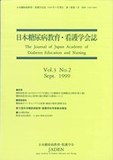Japanese
English
- 有料閲覧
- Abstract 文献概要
- 参考文献 Reference
- サイト内被引用 Cited by
成人糖尿病患者の自己管理行動として食事療法と運動療法を取り上げ,その要因と考えられる属性,自己効力感,家族サポートについて相互関連を明らかにし,これらの要因と自己管理行動との関連を検討するため,2病院の糖尿病外来受診者368名(有効回答率66.3%)を対象に,自記式質問紙調査を行った.その結果,(1)食事自己効力感は,年齢,学歴,職業,罹病期間,家族サポートと,運動自己効力感は,年齢,職業,糖尿病型,家族サポートと有意に関連していた.(2)食事および運動の自己管理行動は,重回帰分析により,ともにそれぞれの自己効力感と最も強く関連していた(食事β= 0.61,運動β=0.78).また,食事自己管理行動は職業のない者で有意に行われており,運動自己管理行動は運動家族ポジティブサポート低値群で有意に行われていなかった.(3)以上より,糖尿病患者教育では,自己効力感を高める働きかけが特に重要であると考えられた.
Purpose: On two areas of diabetic regimen, the diet and exercise; 1) to describe the relation among demographic and diabetic characteristics, self-efficacy, and family support perceived by patients with diabetes, 2) to examine the relation of the characteristics, self-efficacy, and family support to diabetes self-management behavior. Method: At their routine appointment, 244 patients with diabetes at two hospitals completed a self-administered questionnaire including the scales of self-management, self-efficacy, and family support. Results: 1) Dietary self-efficacy was significantly related to age, education, occupation, duration of diabetes, and family support. Exercise self-efficacy was significantly related to age, occupation, type of diabetes, and family support. 2) Self-efficacy was the best predictor of self-management behavior for dietary and exercise regimen by multiple regression analysis in each (β= 0.61for the diet, β= 0.78for the exercise). 3) Patients who didn't have a job showed significantly high dietary self-management behavior. Patients who received low positive-support for exercise from his or her family showed significantly low self-management behavior for exercise. Discussion: Implications for diabetic patient education programs are discussed. The results indicate that patient educators need to increase patients' self-efficacy through patient education programs.
Copyright © 1999, Japan Academy of Diabetes Education and Nursing. All rights reserved.


